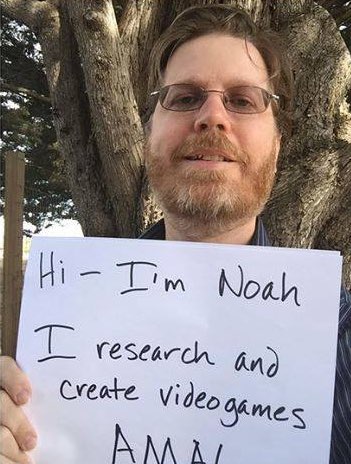Campus News
Ask them anything: gaming researchers host Reddit AMA
Gaming researchers host a Reddit AMA on making games more findable and expressive using computer science.

Three UC Santa Cruz gaming experts are taking to Reddit today to answer questions submitted by some of the 6.17 million Reddit science readers.
Professor Noah Wardrip-Fruin and PhD students James Ryan and Eric Kaltman are hosting a Reddit Ask Me Anything (AMA) about their research on making video games more findable and expressive using computer science approaches, such as natural language processing.
Read more about their work below or head over to Reddit to see their answers to Redditors’ questions.
From the AMA description:
The common categorizations of video games, based on genres, don’t do enough to help game players, game creators, or game scholars find games that might matter to them. Game genres lump together games with vastly different designs, subjects, and player experiences, while separating games with quite close relationships. In response, we have begun developing computational models of game relatedness and tools for exploring those models.
Our current models are based on latent semantic analysis of texts about games, as described in our recent FDG paper, “What We Talk About When We Talk About Games.” (pdf)
Our first set of texts about games is nearly 12,000 game descriptions from Wikipedia — and we are working on incorporating a second set. We have three tools for finding related games that are currently available for the public to use.
First, GameNet provides a network of games, each connected to those most related and unrelated in our model, with summary information and external links.
Second, GameSage allows you to start your search with an idea — perhaps a game you’re thinking of creating, or a game you’ve forgotten the name of — and your description is “folded in” to GameNet’s network.
Third, GameGlobs lets you divide the world of games up into an arbitrary number of groupings in two-dimensional space, then explore the content of each one. All three are part of the GAMECIP project between UC Santa Cruz and Stanford University, which is supported by the IMLS to improve how games are cataloged, cited, and discovered.
The three of us got into doing work like this because we believe games are an important part of culture, and we want to do things to help them reach their full potential. This project is part of our work on making sure that the rich history (and present) of games can be preserved, discussed, and found in the future. We’re also doing work on broadening what can be expressed through games, who can create them, and the conceptual tools we have for understanding them.